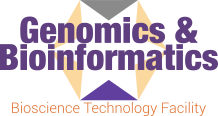Data Science Courses
Below are the dates for the next courses that we are running in York.
Contact us if you are interested.
Introduction to Scientific Computing (1 day)
TBC
An increasing number of scientific projects involve handling large amounts of data, whether it be biological sequence data, weather data, or data of some other type. This one day course aims to teach the basics of using the command line, bringing you up to speed with how to use the command line (terminal) to navigate filesystems, read and write to files, move and copy data between directories and even to other machines, to remotely access other machines, and to do basic parsing of data files. Knowing these basics opens up huge opportunities for working with scientific data. In addition, we will give attendees a flavour of what is possible with programming languages like Python for processing data, and R for data analysis and visualisation.
To register, please download the appropriate application form, complete it and e-mail to BTF Enquiries.
Registration form_Intro to Scientific Computing_31Oct_23 (MS Word ![]() , 26kb)
, 26kb)
Introduction to Python (2 days)
TBC
Python is the programming language of choice for an array of tasks, from data science to machine learning and AI to web programming. This two day course is aimed at those with no prior experience in computer programming and attendees will leave the course with the confidence to use Python for routine data analysis tasks. We’ll take attendees through the core concepts of the Python language, the main data types in Python, and the ways in which those data types can be manipulated. From there, we’ll progress to reading and writing files, and displaying and plotting data (data visualisation). The course focuses on data analysis, but there is an opportunity for attendees to bring their own datasets to explore at the end of the course, if they wish.
To register, please download the appropriate application form, complete it and e-mail to BTF Enquiries.
Registration form_Intro to Python_Nov_23 (MS Word ![]() , 26kb)
, 26kb)
Advanced Python for Machine Learning (2 days)
TBC
The rapid rise of machine learning and AI has made it accessible to almost anyone, and advanced machine learning models can now run on smartphones and tablets (as well as higher spec. machines). This course aims to be a complete introduction to machine learning approaches, with a focus on running these using Python. Attendees should already have a good grasp of using Python for manipulating data, as well as all the core concepts of Python. We’ll begin by taking attendees through the theory of machine learning and deep learning, and then spend a full day working with Tensorflow and the Keras Python library, exploring examples of different types of deep learning models like convolutional neural networks (CNNs) and LSTM neural networks. We’ll end by discussing and thinking about the ethics of machine learning and AI, weighing up the benefits and dangers that it can pose.
To register, please download the appropriate application form, complete it and e-mail to BTF-enquiries.
Advanced Python September Registration Form (MS Word ![]() , 26kb)
, 26kb)
Intermediate Python (2 days)
TBC
Building from our Introduction to Python Programming course, this two day course aims to teach those with a basic knowledge of the core concepts of Python more advanced data science and data analysis skills. Attendees will learn how to read in, manipulate, and output large datasets using the Pandas Python library. From there, they will use unsupervised learning (basic machine learning) approaches including k-means clustering and UMAP to analyse the data further, using the NumPy, SciPy, and Scikit-learn Python libraries. We’ll then visualise and plot the data using the Seaborn Python library. Finally, we’ll demonstrate how Python can be used for more advanced machine learning (deep learning) approaches using Tensorflow and the Keras Python library. Attendees will have the opportunity to bring along and work with their own datasets towards the end of the course, if they wish.
To register, please download the appropriate application form, complete it and e-mail to BTF Enquiries.
Intermediate Python 6th/7th July Registration Form (MS Word ![]() , 26kb)
, 26kb)
Any queries about the content of the above courses, please contact course organiser Alastair Droop
Location: Biology Department, UoY
If you wish to register your interest please email btf-enquiries@york.ac.uk .
Please see below some feedback from our recent course delegates:
Introduction to Python Programming
"Why didn't I learn programming years ago? I am strongly considering returning to take your advanced course."
"I am intending to immediately start experimenting with using what I have learnt to analyse my own research data. What I have learnt has helped me see many places this could be useful that I didn't realise before."
"The pace is good as everyone can work at their own ability."
Python for Biological Data
"Challenging but well pitched for people who have done the introductory course."
"Very new to Python but more comfortable by the end and good to apply to actual sequence data."
"The clarification of object methods and attributes, as well as the Genome Diagram section - particularly useful for me."
"Very thorough course with hands-on assistance and responsive help."
"Good job by all - very supportive environment."

